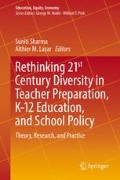Abstract
While the discipline of American Indian Studies has been instrumental in advancing the history and experiences of Native people, in the field of education, there is a troubling knowledge gap by k-12 and post secondary educators. Misinformation and stereotypes about Native people persist in textbooks and educational discourses, making it imperative for the field of education to recognize the importance of Native ways of knowing and the implementation of counter-narratives to be heard in classrooms—at all levels from K-12 to the university. We see numerous examples of classroom textbooks using inaccurate information or lacking the counter-narratives in examinations of Native/Indigenous history and current day issues. This lack of counter-narratives and the silencing of marginalized people and their perspectives is evidence that the US public education system fails students, especially students of color. K-12 teacher certification programs that include coursework on the knowledge/history of people of color and marginalized groups, are promising spaces where preservice teachers might engage with traditionally silenced voices and narratives. As Native women in Higher Education, we present our voices as counter-narratives to the continued colonization of the experiences of indigenous peoples and people of color. We provide the experiences and stories of two Native women in higher education to educate others on the importance of counter-narratives. We also emphasize the importance of Critical Race Theory (CRT), theories of decolonization, and the awareness/analysis of microaggressions in hopes of initiating a dialogue so that educators in K-12 and the university push the boundaries and include Indigenous knowledge and counter-narratives to provoke change.
Access this chapter
Tax calculation will be finalised at checkout
Purchases are for personal use only
References
Berk, R. A. (2017). Microaggressions trilogy: Part 1. Why do microaggressions matter? The Journal of Faculty Development., 31(1), 63–73.
Cast, crew and production team of “The Fantasticks”. (2017, June 20). UW theatre and dance responds to ‘Fantasticks’ walkout: Two voices are important for a dialogue [Letter to the Editor] Laramie Boomerang. Retrieved from http://www.laramieboomerang.com/opinion/uw-theatre-and-dance-responds-to-fantasticks-walkout-two-voices/article_eeb87472-55d3-11e7-99eb-d341e57720f8.html
Deena, S. F. H. (2001). Canonization, colonization, decolonization: A comparative study of political and critical works by minority writers. New York: Peter Lang Publishing, Inc.
Delgado, R., & Stefancic, J. (Eds.). (2000). Critical race theory: The cutting edge (Introduction). New York: New York University.
Goeman, M. (2011). Introduction to Indigenous performance’s: Upsetting the terrains of settler colonialism. American Indian Culture and Research Journal, 35(4), 1–18.
Harro, B. (2000). The cycle of socialization. In M. Adams, W. J. Blumenfeld, R. Castañeda, H. W. Hackman, M. L. Peters, & X. Zúñiga (Eds.), Readings for diversity and social justice (pp. 15–21). New York: Routledge.
Jaime, A. M. (2008, December). Native women: Decolonization and the transcendence of identity. International Journal of Multicultural Education, 10(2). http://ijme.journal.org/index.php/ijme/index.
Jaime, A. M., & Cho, J. (2017). A postcolonial reflection in the audacity of hope: Toward a pedagogy with/for an understanding heart. Multicultural Education Review, 9(4).
Loewen, J. W. (2008). Lies my teacher told me: Everything your American history textbook got wrong. New York: New Press.
Mohanty, C. T. (2003). Feminism without boarders: Decolonizing theory, practicing solidarity. Durham: Duke University Press.
Moore-Gilbert, B. (1997). Postcolonial theory: Context, practices, politics. London: Verso.
Norris, J. (2008). Duoethnography. In L. M. Given (Ed.), The SAGE encyclopedia of qualitative research methods (Vol. 1, pp. 233–236). Los Angeles: Sage.
Norris, J., & Sawyer, R. D. (2012). Towards a dialogic methodology). In J. Norris, R. D. Sawyer, & D. Lund (Eds.), Duoethnography: Dialogic methods for social, health, and educational research (pp. 9–39). Walnut Creek: Left Coast Press, Inc.
Smith, L. T. (1999). Decolonizing methodologies; Research and Indigenous peoples. New York: Zed Books Ltd.
Su, C. (2007). Cracking silent codes: Critical race theory and education organizing. Discourse: Studies in the cultural politics of education, 28(4), 531–548.
Tomaselli, K. G., Dyll, L., & Francis, M. (2008). Self and “other”: Auto-reflexive and Indigenous ethnography. In N. K. Denzin, Y. S. Lincoln, & L. Tuhiwai Smith (Eds.), Handbook of critical and Indigenous methodologies (pp. 347–372). Thousand Oaks: Sage.
Yosso, T. (2005). Whose culture has capital? A critical race theory discussion of community cultural wealth. Race Ethnicity and Education, 8(1), 69–91.
Zamudio, M., Russell, C., Rios, F., & Bridgeman, J. (2011). Critical race theory matters: Education and ideology. New York: Routledge.
Zinn, H. (1990). A people’s history of the United States. New York: Harper & Row.
Author information
Authors and Affiliations
Corresponding author
Editor information
Editors and Affiliations
Rights and permissions
Copyright information
© 2019 Springer Nature Switzerland AG
About this chapter
Cite this chapter
Jaime, A.M., Stagner, T. (2019). Decolonization, Counter-Narratives and Education of Two Native Women in Higher Education. In: Sharma, S., Lazar, A.M. (eds) Rethinking 21st Century Diversity in Teacher Preparation, K-12 Education, and School Policy. Education, Equity, Economy, vol 7. Springer, Cham. https://doi.org/10.1007/978-3-030-02251-8_5
Download citation
DOI: https://doi.org/10.1007/978-3-030-02251-8_5
Published:
Publisher Name: Springer, Cham
Print ISBN: 978-3-030-02250-1
Online ISBN: 978-3-030-02251-8
eBook Packages: EducationEducation (R0)

